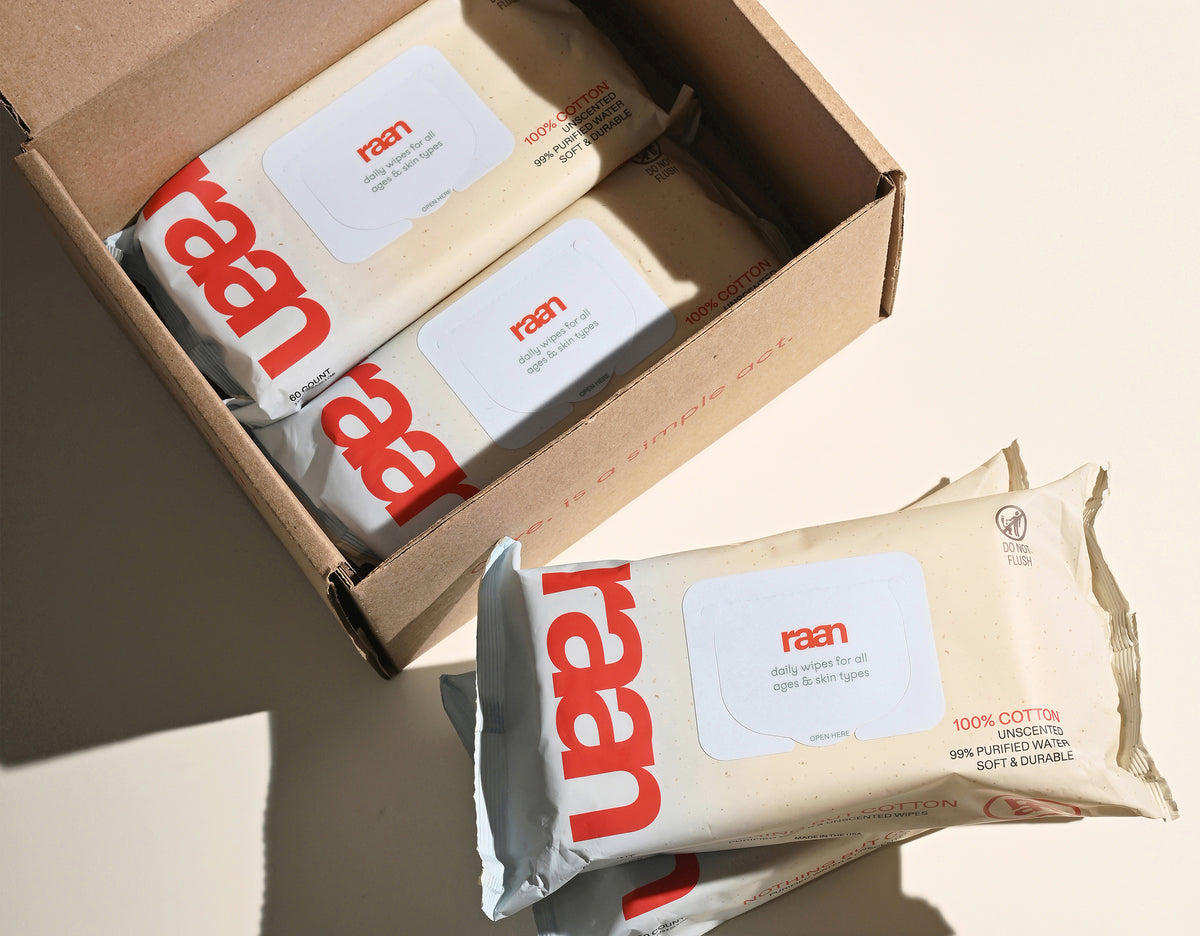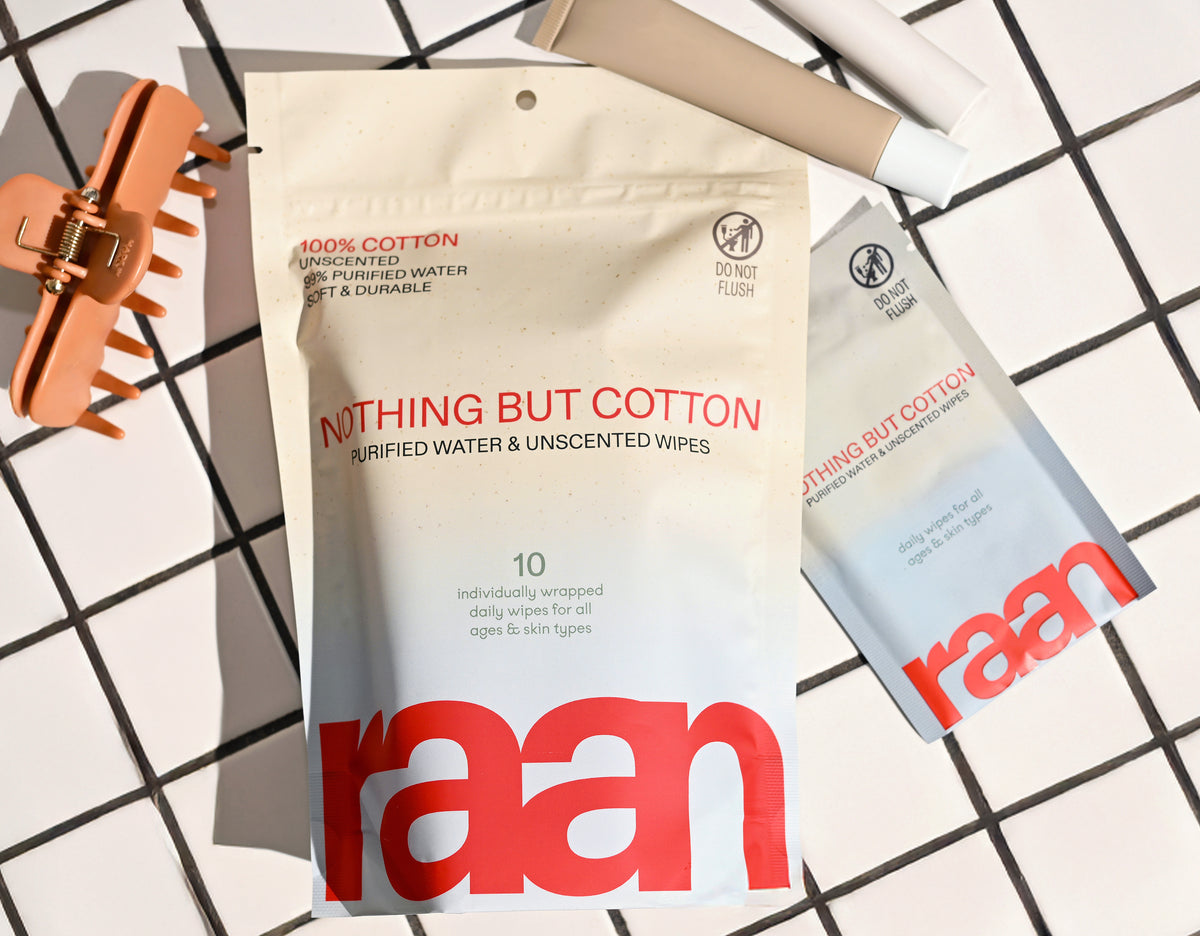Key Takeaways
- Most baby wipes are not designed to kill germs and are not antibacterial.
- Baby wipes are primarily intended for cleaning and refreshing the skin.
- The safest baby wipes focus on gentle cleaning rather than germ elimination.
- Using baby wipes for antibacterial purposes may not provide effective germ protection.
Table of Contents
- Are Baby Wipes Antibacterial? The Real Answer
- What "Antibacterial" Actually Means
- How Baby Wipes Actually Work
- When Baby Wipes Work (And When They Don't)
- Decoding Clean Claims on Wipe Packages
- Smart Cleaning Strategies for Real-World Situations
- Baby Wipes vs. Antibacterial Wipes: The Real Differences
- Reading Labels: What Actually Matters
- Building Effective Hygiene Routines
- When Skin Gets Irritated: Quick Solutions
- Beyond Single-Product Solutions
- The Science of Simplicity
Are Baby Wipes Antibacterial? The Real Answer
You're wiping down your toddler after a messy snack, cleaning your hands on-the-go, or refreshing your face after a workout. The question hits: are baby wipes antibacterial? The honest answer is no, most baby wipes, including the safest ones, are not designed to kill germs.
For parents seeking a gentle yet effective cleaning solution, the only unbleached, 100% cotton baby wipe for sensitive skin offers peace of mind without harsh chemicals or synthetic fibers.
If you need something even more portable for on-the-go messes, consider the unbleached, 100% cotton pocket wipe for sensitive skin, which provides the same gentle cleaning power in a convenient, individually wrapped format.
What "Antibacterial" Actually Means

For a product to claim antibacterial properties, it must contain active ingredients that kill or inhibit bacterial growth, think alcohol concentrations of 60-70%, quaternary ammonium compounds, or bleach-based solutions. These ingredients require specific regulatory approval and testing.
| Product Type | Purpose | Active Ingredients | Skin Safety |
|---|---|---|---|
| Baby Wipes | Gentle cleansing | Water, aloe, food-grade preservatives | Safe for daily use |
| Antibacterial Wipes | Kill bacteria | Alcohol, quats, synthetic chemicals | Harsh, irritating |
| Disinfectant Wipes | Surface sanitization | Bleach, strong antimicrobials | Not for skin contact |
Baby wipes work through physical removal, lifting away dirt, food, and mess, rather than chemical destruction of microorganisms. This gentler approach protects sensitive skin while still providing effective cleaning.
How Baby Wipes Actually Work
Quality baby wipes like Raan's contain just five EWG-verified ingredients: purified water (the main cleaning agent), organic aloe for moisture, food-grade preservatives to protect the product during storage, ethylhexylglycerin for skin conditioning, and citric acid for pH balance.
The preservatives, sodium benzoate and potassium sorbate, prevent mold and bacteria from growing in the package, not on your skin. These are the same preservatives used in food products, chosen specifically because they're gentle enough for daily contact with sensitive areas.
The unbleached, 100% cotton material provides the physical cleaning action. Unlike synthetic wipes made from plastic fibers, cotton naturally lifts and holds onto debris without requiring harsh chemicals or fragrances to mask odors.
When Baby Wipes Work (And When They Don't)
Baby wipes excel at everyday messes: diaper changes, sticky fingers, post-meal cleanup, and quick face refreshes. They're perfect for removing visible dirt and maintaining basic cleanliness throughout the day.
However, when you need actual germ-killing power, after handling raw meat, cleaning up illness-related messes, or sanitizing surfaces, baby wipes won't cut it. You'll need soap and water for hands, or EPA-registered disinfectants for surfaces.
This limitation is actually a feature, not a bug. The gentle formulation that makes baby wipes safe for multiple daily uses on delicate skin is precisely why they don't contain harsh antimicrobial agents.
Decoding Clean Claims on Wipe Packages

Marketing language can muddy the waters. Terms like "kills 99.9% of germs" clearly indicate antibacterial wipes, avoid these for skin contact. Look instead for "gentle cleansing," "fragrance-free," and third-party certifications like EWG Verified.
Red flags include mystery ingredients like "fragrance" or "parfum," plastic-based materials, and bleaching agents. Quality wipes list every ingredient clearly and choose materials that align with their gentle purpose.
The question "are baby wipes antibacterial" often stems from confusion about these marketing claims. The most trustworthy brands are transparent about what their products do and don't do, helping you choose the right tool for each job.
Smart Cleaning Strategies for Real-World Situations
Use baby wipes for diaper changes, sticky hands after snacks, quick face refreshes, and wiping down high chairs. They're your go-to for visible messes and maintaining everyday cleanliness without harsh chemicals.
Skip baby wipes when you need actual sanitization, after using public restrooms, handling raw meat, or cleaning up illness-related messes. In these situations, prioritize soap and water for hands, or EPA-registered disinfectants for surfaces.
The most effective approach combines both: use gentle wipes like Raan's for daily cleaning, then follow with appropriate sanitizing methods when germ-killing is actually necessary. This protects sensitive skin while maintaining proper hygiene standards.
For busy parents, keep this simple rule: wipes for mess removal, soap for true cleanliness. Understanding that baby wipes are not antibacterial helps you build more effective cleaning routines without relying on a single product for every situation.
Baby Wipes vs. Antibacterial Wipes: The Real Differences
| Feature | Baby Wipes (Raan) | Antibacterial Wipes |
|---|---|---|
| Primary Function | Gentle cleaning and debris removal | Killing bacteria on hard surfaces |
| Key Ingredients | Water, organic aloe, food-grade preservatives | Alcohol, quats, synthetic fragrances |
| Material | Unbleached, 100% cotton | Plastic-based synthetic fibers |
| Safe for Baby Skin | Yes, designed for sensitive areas | No, can cause irritation and dryness |
| Daily Use Safety | Multiple times daily without concern | Limited use to prevent skin damage |
| Environmental Impact | Biodegradable cotton, minimal plastic packaging | Plastic fibers, chemical residue |
The fundamental difference lies in purpose and formulation. Baby wipes prioritize skin safety and gentle cleaning, while antibacterial wipes focus on microbial elimination at the expense of skin compatibility.
This explains why asking "are baby wipes antibacterial" reveals a common misconception. The gentleness that makes baby wipes suitable for sensitive skin is precisely why they don't contain harsh antimicrobial agents.
Raan's approach exemplifies this philosophy: five simple, EWG-verified ingredients that clean effectively without compromising skin health or environmental responsibility.
For more on how baby wipes compare to other options, you might find this article on best baby wipes for sensitive skin helpful.
Reading Labels: What Actually Matters

Quality baby wipes list every ingredient clearly, starting with water as the primary component. Avoid products with "fragrance," "parfum," or long lists of unpronounceable chemicals, these often indicate synthetic additives that can irritate sensitive skin.
Look for third-party certifications like EWG Verified, which requires rigorous ingredient screening, and materials certifications like Natural Cotton Seal. These independent validations cut through marketing claims to verify actual product safety.
The preservatives in baby wipes should be food-grade, the same ones used in products you'd consume. When brands choose sodium benzoate and potassium sorbate over synthetic alternatives, they're prioritizing gentle effectiveness over shelf-life extension or cost savings.
Building Effective Hygiene Routines
The most practical approach combines gentle daily cleaning with targeted sanitization. Use unbleached cotton wipes for routine messes, then escalate to soap and water or surface disinfectants when actual germ-killing is needed.
For families with sensitive skin concerns, this two-tier system prevents over-exposure to harsh chemicals while maintaining appropriate cleanliness standards. Baby wipes handle 80% of daily cleaning needs without the irritation risk of antibacterial formulations.
Remember that physical cleaning, what baby wipes do best, removes most harmful substances through mechanical action. The question "are baby wipes antibacterial" often misses this point: effective cleaning doesn't always require chemical warfare against microbes.
The Bottom Line
Baby wipes aren't antibacterial by design, not by accident. This gentleness makes them safe for multiple daily uses on the most sensitive skin, while still providing effective cleaning for real-world messes.
For a convenient bundle that covers all your daily cleaning needs, check out the mess-ready pack for families.
When Skin Gets Irritated: Quick Solutions
If irritation occurs after using any wipes, immediately rinse the affected area with plain water and discontinue use. Switch to wipes with shorter ingredient lists, ideally just water, aloe, and food-grade preservatives without synthetic fragrances or plastic fibers.
The most common culprits behind wipe-related irritation are synthetic fragrances, bleached materials, and plastic-based substrates that trap bacteria. Raan's unbleached, 100% cotton construction eliminates these irritation triggers while maintaining effective cleaning power through gentle, mechanical debris removal.
For families dealing with eczema or sensitive skin conditions, the "less is more" principle becomes crucial. Five simple, EWG-verified ingredients provide peace of mind without compromising cleaning effectiveness, proving that gentle formulations can handle real-world messes without harsh chemical intervention.
To learn more about gentle options, see this guide on soft wipes for newborn skincare.
Beyond Single-Product Solutions

The most effective hygiene routines layer different tools for different purposes. Understanding that baby wipes are not antibacterial helps you build more strategic cleaning habits: wipes for visible debris, soap for thorough cleansing, and targeted disinfectants only when necessary.
This approach reduces chemical exposure while improving actual cleanliness. Rather than relying on harsh antibacterial wipes for every situation, you can use gentle cotton wipes for 80% of daily cleaning needs, then escalate to appropriate sanitizing methods when germ-killing is genuinely required.
Raan's minimalist formulation supports this philosophy by providing reliable, daily-use cleaning without the skin compromise that comes from antibacterial formulations. The result is better skin health and more effective overall hygiene practices.
For more details on what goes into your wipes, read about what are wipes made of and why it matters for your family.
The Science of Simplicity
The question "are baby wipes antibacterial" ultimately reveals why transparency matters in personal care. Most baby wipes aren't antibacterial because they're designed for something more valuable: safe, repeated use on the most sensitive skin without irritation or chemical buildup.
This intentional gentleness allows for multiple daily uses without the drying effects of alcohol-based sanitizers or the irritation potential of synthetic antimicrobials. Physical cleaning through soft, unbleached cotton proves remarkably effective at removing harmful substances without chemical intervention.
Your Next Step
Choose wipes based on your actual needs: gentle daily cleaning with baby wipes, targeted sanitization with appropriate products when necessary. This two-tier approach protects sensitive skin while maintaining effective hygiene standards for real families dealing with real messes.
If you're just getting started, the starter set is a great way to try a variety of gentle, unbleached cotton wipes for your family's needs.
For authoritative guidance on the use of antibacterial wipes, see the FDA's resource on should you use antibacterial wipes.
For a scientific overview of chemical disinfectants and their uses, visit the CDC's page on chemical disinfection methods.
Frequently Asked Questions
Are baby wipes effective at killing bacteria and germs?
Most baby wipes are not designed to kill bacteria or germs. They focus on gentle cleaning and refreshing the skin rather than eliminating microbes.
What ingredients make a wipe truly antibacterial compared to regular baby wipes?
Truly antibacterial wipes contain active ingredients like alcohol (60-70%), quaternary ammonium compounds, or bleach-based solutions that are proven to kill or inhibit bacterial growth. Regular baby wipes use gentle ingredients like purified water and aloe without these antimicrobial agents.
How do baby wipes clean the skin if they don't contain antibacterial agents?
Baby wipes clean by physically lifting away dirt, food, and mess from the skin’s surface. Their gentle formula and soft, unbleached cotton help remove impurities without harsh chemicals or irritation.
When should I choose antibacterial or disinfectant wipes over baby wipes for cleaning?
Use antibacterial or disinfectant wipes when you need to kill germs on hard surfaces or in situations requiring sanitization. For skin care and everyday messes, baby wipes offer safer, gentler cleaning without harsh chemicals.






